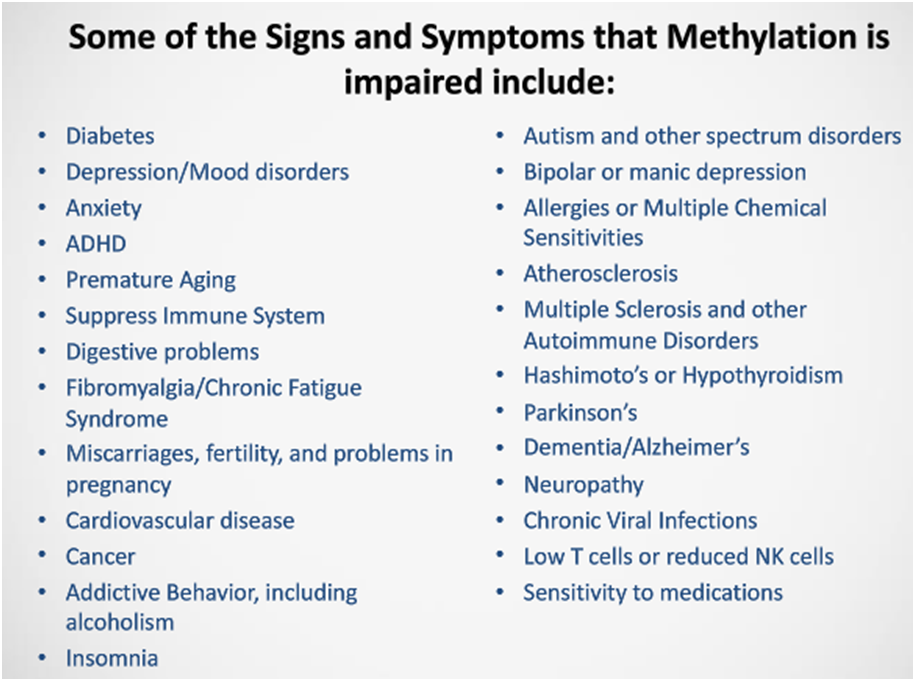Signs you need Methylation Support
We discussed previously what Methylation is, but today we're going to look a little more in-depth at many signs your body gives you to let you know its out of balance.

Why do you need to care about methylation? Even though it sounds like a complicated chemical process- it’s actually a simple and necessary chemical process that is ongoing in your body constantly.
Methylation involves adding a 'methyl group' onto other chemical compounds which then allows the body to do most of its processes.
If you struggle with mood, metabolism, MTHFR or a myriad of health conditions, then your methylation might be crying out for help.
Or perhaps you already know your methylation system needs support (like if you have a MTHFR gene mutation, allergies, PMS, autoimmune conditions etc).

Because it is so essential for the chemical processes in your body, and because of our busy lifestyles and nutrient-depleted foods, it could be that many of us need support when it comes to methylation.

Some people may even have genetic differences, polymorphisms that reduce their ability to methylate quite significantly; (like the MTHFR Gene Mutation.) But you don’t necessarily need to know about your genes.

First things first — let’s wrap our minds around what methylation is and why it’s so important.
Many people haven’t even heard the word methylation, yet it’s one of the most important biochemical processes happening continually in nearly every one of our cells.
Down at the cellular level, methylation is simply the addition of a tiny molecule called a methyl group (CH3) to another molecule which ‘activates’ the receiving molecule. The body’s main methyl donor is SAMe (S-adenosylmethionine). SAMe travels around the body, giving methyl groups to molecules in need. Once activated, these molecules can now perform their jobs of keeping our body systems running smoothly.
A common example of methylation is the addition of a methyl group to folate, which converts it into the active form of folate known as 5-MTHF (methylfolate). Unlike the man-made form of folic acid found in processed foods and cheap supplements, the body can directly use methylfolate in all of the important cellular processes where folate is required.
People with the MTHFR genetic mutation have difficulties activating folate due to a genetic mutation that affects the ability of the MTHFR enzyme to add a methyl group to folate. Thus, people with MTHFR often find they feel much better when they supplement with methylfolate which helps them maintain folate status and proper methylation.

Another example of methylation is the addition of a methyl group to homocysteine (a marker of inflammation and cardiovascular disease) to convert it into methionine, a harmless amino acid. Moreover, the addition and removal of methyl groups to and from DNA are responsible for turning genes on and off. So as we can see, we need our methylation working properly in order to maintain our health.
Proper methylation is essential for life and is involved in many functions in the body such as:
Gene expression
Fetal development
Production of neurotransmitters
Maintaining proper homocysteine levels
Detoxification and processing of heavy metals like arsenic
Production of glutathione, the body’s master antioxidant
Production of crucial compounds like creatine, phosphatidylcholine and carnitine.
Maintaining proper histamine levels
Mental and brain health
Nervous system health
Cardiovascular health
Mitochondrial health
Reproductive health
Liver health
We should be doing everything we can to optimize our body’s ability to effectively methylate because it’s such a critical process. It’s not that one can simply do it once and be done. Methylation must be continually maintained throughout life,. Problems start arising when methylation is not optimized, meaning, it’s happening slower than it should be (or the opposite: it’s happening too fast!). In general, the methylation cycle slows down when it doesn’t have enough methyl-supportive nutrients and speeds up when it has too many.
Important methylation support nutrients include:
Riboflavin
Vitamin B6
Methylfolate
Vitamin B12 in the form of Methylcobalamin
Choline
Betaine (trimethylglycine, TMG)
Magnesium
Zinc
Sam-E


Whether you have an MTHFR gene mutation or not, here are some common signs your body gives you to let you know when your methylation cycles aren’t working properly.

1. Hormonal imbalances: PCOS, PMS, fibroids, endometriosis etc.
Methylation is important for metabolising and detoxifying oestrogen, and so if it is a little slow, it can lead to the symptoms above. Also, if your periods are excessively heavy, you may need more iron, folate and B12 to build new blood.
2. Infertility (both male and female), history of miscarriage or pregnancy related complications (e.g. pre-eclampsia).
Methylation is absolutely crucial to the growth of new tissue, so it is vital for fertility, maintaining a healthy pregnancy and supporting foetal growth. Your need for nutrients, (folic acid from folate in particular) increases exponentially during pregnancy.
3. Cardiovascular disease: (high blood pressure, poor circulation, Tachacardia)
If you’re not methylating properly, you may end up with high levels of homocysteine. Excess homocysteine can lead to inflammation and free radical damage, especially in your blood vessels.
4. Mood and mental health issues: (mood swings, depression, anxiety, bipolar, OCD etc).
Methylation is needed for the production and metabolism of several key mood-modulating neurotransmitters; dopamine, serotonin, noradrenalin, adrenalin. Therefore, if disrupted, it can lead to either low, high, or fluctuating levels, having a negative effect on our mood and stress resilience.
5. Autoimmune conditions: (e.g. multiple sclerosis, rheumatoid arthritis, autoimmune, thyroid, mast cells etc)
Methylation is key to immune regulation and repair. Many studies link high homocysteine and genetic factors affecting methylation, to autoimmune conditions in general.
6. Memory problems, insomnia, dementia, Alzheimer's disease
Just like high homocysteine can be damaging to our blood vessels, it can have the same effect in the brain by damaging our neurons and causing inflammation. Multiple studies have linked poor methylation to cognitive problems. In order to sleep, we need to produce the sleep hormone – melatonin, from serotonin, and guess what, this process also happens through methylation!
7. Chronic fatigue, ME (Myalgic Encephalomyelitis), low energy
Energy production, healthy thyroid, adrenal and nervous function are all dependant on methylation and a good supply of vitamin B12, B6, folate, zinc and magnesium, all of which get the methylation cycle going.
8. Allergies and histamine intolerance: eczema, hay fever, headaches, congestion, hives etc.
Allergies are characterised by an increased production of histamine – a chemical that causes all of the symptoms we associated with allergies: sneezing, itching, runny nose or watery eyes. Excess histamine in the cells is cleared by adding a ‘methyl group’ to it. This makes it inactive and ready to be excreted.
9. Bile production (or excess production) leading to digestive problems, fat malabsorption, and gallbladder issues (like gall stones, and excess acid etc.)
Bile is a thick, yellow-green fluid produced by your liver and stored in the gallbladder. It plays a few vital roles. When secreted into the intestines, it has anti-microbial properties, cleansing the bowel and preventing overgrowth of unwelcome bacteria/yeast. It also aids absorption of fats and fat-soluble nutrients (vitamin A, D, E & K), and helps your body excrete toxins and excess cholesterol. You can see how vital it is to our health! However, excess production can produce severe bouts of acid, and right side pain when the gal bladder spasms when excreting the bile causing inflammation and burning to the digestive tract.
10. You have an inflammatory condition (e.g. arthritis, inflammatory bowel syndrome (IBS)
Constant inflammation is a big strain on the body in general and it can drain your ‘methyl pool’ as well as damage the cells. If that pool is continuously ‘drained’ by inflammation, other important processes, such as tissue repair or neurotransmitter production can be affected. If you have a chronic digestive disorder such as IBS or pernicious anaemia (vitamin B12 depletion and body can’t make enough red blood cells), your absorption of vital nutrients, such as vitamin B12, may also be significantly reduced.
In addition, if you have experienced any of the problems above, your requirements may be even higher in comparison to a person who doesn't have methylation issues, therefore diet alone may not be enough.
Are you affected by one of the problems above? If so, it could be that you need to promote healthy methylation. By doing so, you would be giving your body a helping hand. A good start would be to try a multinutrient with the right nutrients that support methylation – methylfolate or ‘5-MTHF’ and vitamin B12, especially methylcoblamain.

Along with the steps listed above; here are other key steps in imporoving Methylation.
Early to Bed, Early to Rise: Sleep is vital to your wellbeing and methylation cycles. Methylation cycles mirror your circadian rhythms. Ever notice how you may get itchier or experience other symptoms when you start getting tired? That’s the body’s way of letting you know you are out of methyl donors. You need to get 8-10 hours of sleep each night, and being in bed by 9-10pm at night; as it works best to get 2-3 hours of sleep before midnight
Exercise: small studies have found that a single bout of exercise leads to immediate changes in the methylation patterns of certain genes in muscle cells. Exercise also helps with metabolic diseases (like Diabetes).
A bout of intense exercise can change the way your genes are regulated, scientists have shown. These changes led to an increase in enzymes that are involved in energy production. However, intense exercising can cause demethylation of DNA issues. So abstain from intense training.
Diet:
If you know your methylation system needs support, focus on eating a healthy diet that includes an abundance of methyl donors. If tolerated, aim for getting between 1/2 and 1 gram of protein per pound of bodyweight to ensure you’re getting enough methionine and the other amino acids and nutrients
needed to recycle homocysteine. Include pastured organ meats a few times a week for folate and trace minerals. Consume a plethora and a variety of different vegetables, including dark green leafy veggies in the mix for B’s and other vitamins. Eating whole foods will help you to meet your body’s needs for many of the nutrients required for methylation.

To balance methylation cycles, requires a lifestyle change and due diligence to carefully not use up all of your methyl donors. So get plenty of rest when you need it, eat a fresh and light diet, and get your body moving!!
Love and Light,
Happy Healing.
.jpg)


